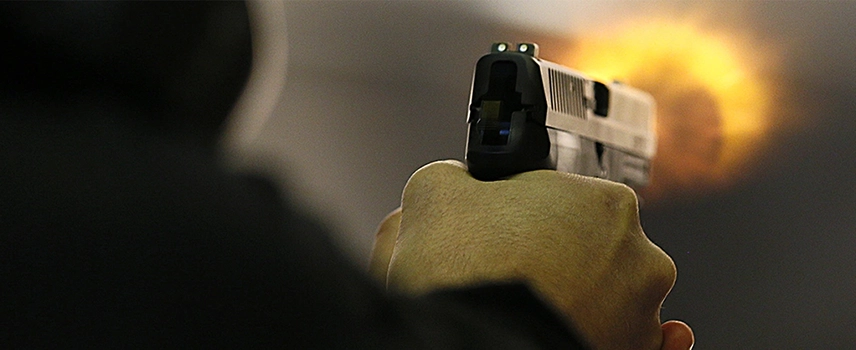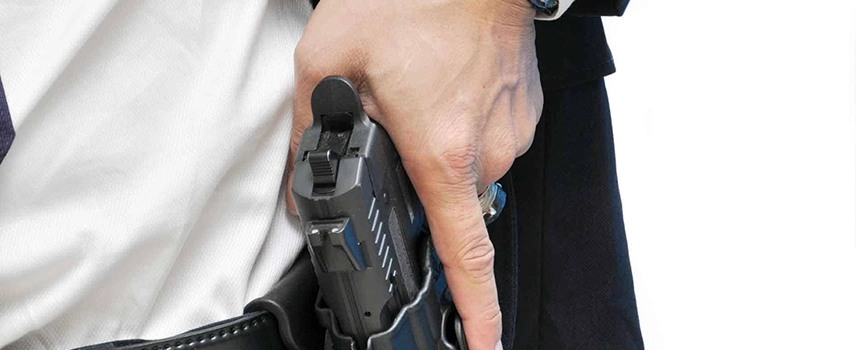Can you hire armed bodyguards in the UK?
“VIPs visiting the UK seek Armed Private Security but the reality is that it's not possible!”
by Virginie Roux | 24th January 2019

Is it possible to have armed Bodyguards in the UK?
At present, it is not lawful for any members of the public to carry a firearm, for the purpose of Close Protection. This includes SIA licensed and professionally trained Bodyguards.
Gun control laws are tough in the United Kingdom, a country that prides itself for having one of the lowest rates of gun-related crimes in the world. Since 1997, the private possession of handguns and other weapons classified as firearms (pepper spray, CS gaz and the likes), is banned in the United Kingdom by the Firearms Act 1997 that came into force after the mass shooting at Dunblane Primary School in 1996 that saw the death of 16 school children.
The use of Firearms in UK Policing
“Armed police only make up 5% of the total of all police officers in England, Scotland and Wales”
The vast majority of police officers in the United Kingdom, with the exception of Northern Ireland, are unarmed when they are on duty. Instead, every police force has its own firearms unit that is called upon and deployed to respond to major incidents involving guns.
But, in the current climate of fear caused by the rise of terrorist attacks throughout Europe, British citizens are increasingly concerned about their safety and some are casting doubts on the legitimacy of not arming police officers. Thus, some consider for instance that the death of the police officer, who was stood at the gates of the Parliament during the Westminster attack, could have been avoided if he would have been armed.
Certain individuals may be more at risk than others, if they are showing signs of wealth or are in the spotlight. For those reasons, we regularly have clients inquiring about the use of armed protection in the UK. Yet, are UK bodyguards allowed to carry guns to protect their principal? This is a question that we will answer in length in this article.
In the UK, private security companies aren’t authorised to provide armed security. Therefore, it is not possible for any Private Security including Bodyguards to ensure your personal protection using firearms in the UK.
Armed protection is only provided by the Protection Command of the London Metropolitan police and other specialist police forces for diplomatic and royalty protection of high-profile state figures, royals, foreign dignitaries or diplomats. The recourse to this service will have to be assessed on a case by case basis and the decision will be made by the Home Secretary. To be approved, it must either be needed in the national interest, gathered intelligence demonstrate that the risk is severe, or there must be a terrorist threat.
Specialist units of the Met Police such as the Royalty and Specialist Protection (RaSP) unit will draw their firarms when the danger is deemed high.

Armed Protection Vs Unarmed Protection?
Unarmed ProtectionPrivate Bodyguards are trained to keep their principal safe, making use of their intelligence before resorting to the use of force. They carefully organise their clients’ every move, conducting reconnaissance prior to going to a venue and planning meticulously their routes to avoid non-go areas, jammed roads that are more prone to car-hijacking or demonstrations in a city, where the situation may worsen and affect security of the people that are close by.
They must also have good situational awareness, detecting suspicious behaviour in their surroundings to react swiftly to danger and move their principal to a safer environment.
A professional bodyguard is proficient at managing conflict. With no right to carry a firearm, the use of force must be considered in the last resort where no other alternative is possible, as their personal legal responsibility will be at stake and they may have to defend themselves in court to prove that their act was justified. If left without any other possibility, a bodyguard would respond to an attacker knowing that many master the use of a martial art or are trained in unarmed combat.
Moreover, a large majority of close protection operatives are former military or police that bring their experience that they acquired in the forces to their new role.
Effective commercial executive protection is based on discretion. As a private close protection provider, Intelligent Protection International Limited usually recommends covert protection, known also as Protective Surveillance. In such scenario, bodyguards blend in the background of the principal to remain unnoticed and avoid drawing attention, while keeping a watchful eye.
Armed ProtectionIn contrast, the diplomatic and royal protection squad from the London Met Police that offers armed protection to Government’s officials, visiting Heads of State and monarchs, possess similar skills in Close Protection as private operatives, including hand-to-hand combat, event and contingency planning. But their training gives them complementary skills certified by the College of Policing standards, such as those linked to firearms use on how to handle a firearm and shoot, and tactics to use.
The work of Personal Protection Police Officers (PPO) was recently portrayed by the TV character, David Budd in the Bodyguard TV series on the BBC. Yet, the representation of his work as a PPO was not accurate and is far from reality, it showed him not working as a team and getting involved in areas outside that of his own duties, as described in our recent blog article: The BBC Series: Bodyguard – Fact from Fiction.
On top of their normal police training, Personal Protection police Officers receive extensive training for 26 weeks and have to qualify as an Authorised Firearms Officer (AFO) prior to their appointment. They must maintain their shooting skills and be reassessed annually to keep hold of their police firearm permit. They operate mostly as part of a large team in plainclothes, carrying a concealed firearm. The Close Protection of the principal is usually overt and is seen as a deterrent method to keep away the public.
This form of security is meant to be preventive, rather than offensive. In the event that a Personal Protection police Officer had shot someone to protect the principal, he would be personally liable and would have to justify in court that the use of armed force was reasonable and was absolutely necessary to prevent the crime, as per Section three of the 1967 Criminal Law Act.
Close Protection and Firearms Training
There are many international firms, including some British firms, who provide armed security in the hostile environments of the Middle East and Africa. There are also many that provide Maritime Security and Super Yacht Security. Yet, there are few internationally recognised firearms qualifications, instead the industry relies upon "Weapons Competency courses", as required by ISO 28007-1:2015 Private Maritime Security Certification.
Many people in the UK (and European) Security Industry will argue that vetting, selection and training of Close Protection Officers simply do not go far enough as it is. Most certainly, not far enough to introduce firearms should there (unlikely as it may be) be a change in UK laws in relation to firearms.
Should the UK reconsider its position on the use of firearms?
Whilst the United Kingdom restricts the use of firearms for Close Protection to a limited and selected number of police officers, who are government-trained, neighbouring European countries like France are reviewing their policy on armed security to respond better to the terrorist threat and growing security risks. The French Government now authorised private security guards and bodyguards to carry guns under rare circumstances, when exposed to an exceptional level of threat, providing that they undergo the required training for armed security in France.
It will for sure be interesting to monitor the close protection industry in France, to see how they deal with the introduction of firearms for selcetive security operations. It has to be remembered also that in France the security industry is much more adviced that in the UK on company licensing, operative licensing and continuation training, etc. the UK is way behind and has got a long way to develope its standards. A step too far to even think about Personal Security officers carrying firearms. This opens up for more debate on whether or not the UK should reconsider its policy on firearms, considering the current security climate.
If you are still concerned about your personal security and are interested in hiring a professional Bodyguard, please see our Bodyguard Services page.